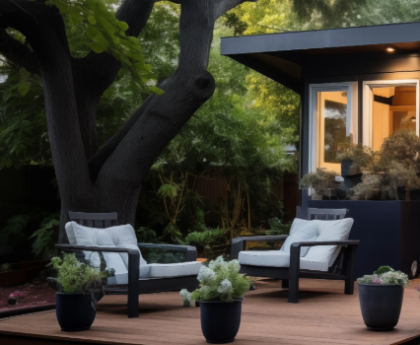
Gilbert last week had to scrap its proposed revisions to standards for accessory dwelling units after the governor inked a new law that takes away local control over these structures.
Under the new legislation, owners of single-family homes will be allowed to build up to two backyard rentals – one attached to the main home and one in the backyard – by right.
Homes on acre lots and larger could put in three units. And cities can’t force additional parking or require that ADUs look similar to the main home.
The new law goes into effect 90 days after the state Legislature ends its session. When the session ends is unclear, as not even a preliminary 2024-25 state budget has been proposed.
Town staff has been working for over a year revising the town’s land development code to streamline the process and to ensure design standards were on par with the rest of Gilbert, according to Planning Manager Eva Cutro at last week’s study session.
She noted that demand for ADUs, or casitas, in town has doubled in the last three years.
“We will now have to make revisions to come into compliance with House Bill 2720,” Cutro said. “House Bill 2720 states that a municipality has to adopt regulations by Jan. 1 2025 or else accessory dwelling units shall be allowed on all lots zoned for residential use in the municipality without limits.
“So we will have to quickly come up with code language. You’ll see me shortly before Jan. 1.”
Cutro said that currently Gilbert is actually more generous than its neighbors and already allows for a guest house and one accessory dwelling unit on lots 6,000 square feet and up with a use permit. She said it is unclear if the law will apply to all other residential lots in town.
“Many other municipalities only allow one or don’t allow them at all,” Cutro said.
Where the town differs from the new law is the allowance of an additional detached dwelling unit on parcels 1 acre or larger but that third unit must be a “restricted affordable dwelling unit,” according to Cutro.
Affordable is defined as households earning up to 80% of the area’s median income, she said. Mayor Brigette Peterson pointed out that in Gilbert, it means a household income of about $81,000.
Under Gilbert’s current code, guest homes can’t be rented and can’t have full kitchens while ADUs can be rented and have kitchens, according to Cutro.
“House Bill 2720 does not differentiate between the two,” Cutro said. “Accessory dwelling units may or may not include kitchen facilities but they do prohibit municipalities from putting restrictions on long-term rental housing.
“When you look at long-term rental housing their definition was for 90 days or on a month-by-month basis.”
Cutro said the law also does not require that the renter be somehow related to the owner.
She said that Gilbert currently only allows for the main house and the ADU to be rented but under the new law a person could have up to three rentals on larger parcels.
Under the town’s code secondary dwelling units, except for those built over a detached garage, must meet the same setback as the main home, according to Cutro.
Under the new law, municipalities can’t set rear and side setbacks for ADUs that are more than 5 feet from the property line.
This is probably the biggest change because the town currently requires ADUs on residential acre lots to have side and rear setbacks of 30 and 40 feet, respectively, according to Cutro.
“Only on our smallest lots do we start approaching 5- to 10-foot setbacks,” she said.
The new law also does away with the town’s requirement that ADUs have compatible design in materials, colors and architecture style with the main dwelling.
Cutro said the town has denied requests for container homes on lots because they do not match the main house on the property.
The law also prohibits Gilbert from requiring additional parking on site for the ADUs, she added. Currently the town requires that an ADU provide one additional off-street parking space.
“And lastly the Land Development Code requires an administrative use permit for all accessory dwelling units and throughout this process staff gets to review the dwelling unit to make sure it matches the main home,” she said.
“Letters are also sent to the neighbors to make them aware that an access accessory dwelling unit may be going up in their neighborhood. While they can’t make demands they could certainly make suggestions at that time.
“Under House Bill 2720 accessory dwelling units are now permitted uses. So by right you can have them. So you would just apply for building permits and there would not be any use permit required.”
Although the new law requires that a single-family home must be greater in square footage that the accessory dwelling unit, Peterson noted that “there’s no minimum or maximum or percentage put on that.”
“So if I have a 2,000-square-foot home, the other could be 1,999 square feet if they fit on the property,” Peterson asked.
That’s what staff is assuming, Cutro responded, saying that they were still reviewing the language.
Councilwoman Kathy Tilque criticized state lawmakers over the bill.
“It is really taking away the public’s ability to have any input into what’s happening in their community and their neighborhoods,” Tilque said.
She then asked how the law affected HOAs.
Cutro said it was her understanding that the law would affect HOAs “that don’t have limits on their standards for ADUs in their CC&Rs now.
According to Town Attorney Chris Payne, the law expressly allows for HOAs that have prohibited ADUs in its CC&Rs to continue with that prohibition.
“I’m assuming an HOA could prohibit if they go through the process and amend their existing CC&Rs,” he said.
Peterson gave a heads-up to HOAs in town.
“If there are HOAs out there listening right now that don’t’ have ADUs in their CC&Rs and want to update something, they have 90 days from the date that the session ends,” Peterson said.
Councilman Jim Torgeson expressed his “exasperation with our Legislature.”
“You almost feel like why are we here,” he said. “They’re telling us how to run our municipality remotely.
“I’m supportive of people have accessory dwelling units for a myriad of reasons. But to do it in such a manner is really counterproductive for a community.”
According to the governor and legislators, the new law is their answer to the shortage of housing in the state.
Those who lobbied against HB 2720, however, pushed back against that claim because the law lacked a ban on using the ADUs as short-term rentals like Airbnbs.
“I’m glad the Legislature heard my calls to come to the table to pass commonsense, bipartisan legislation that will expand housing options and help mitigate the effects of rising costs to make life more affordable for everyday Arizonans,’’ Gov. Katie Hobbs said in a statement.
The governor also signed HB2721 last week, which is designed to spur the construction of new and smaller “middle housing’’ options like duplexes, triplexes and townhomes.
The law states that cities of 75,000 or larger must let builders put those homes on all single-family lots within a mile of a central business district, areas cities designate at their core.
Bob Christie of Capitol Media Services contributed to the story.



